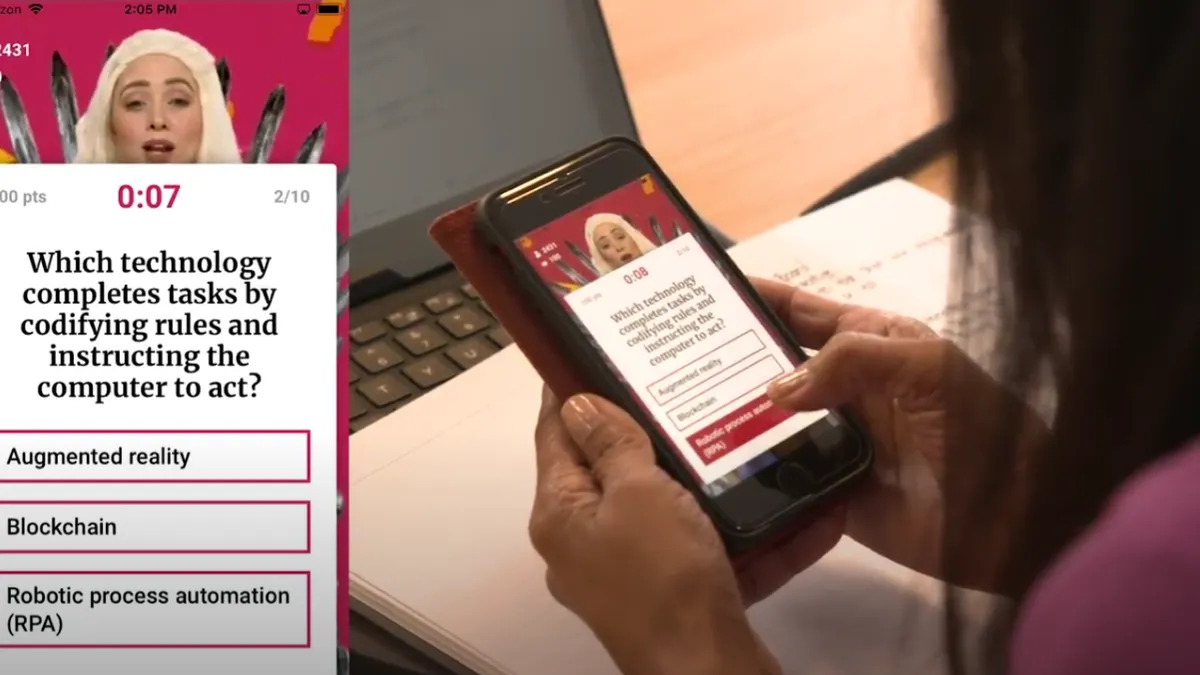Gamification can be effective in building employee engagement and teaching digital skills in a virtual environment, especially amid the COVID-19 pandemic, according to PwC, a global professional services firm.
"We asked ourselves the question, 'why are video games so successful?'" PwC Chief Learning Officer Leah Houde said during a virtual media presentation July 23. "For decades, video games have somehow tapped into human needs for autonomy, mastery, purpose and relatedness. Research has shown that these are core fundamental needs that humans have." And, business outcomes are tied to how well employees are engaged, she added.
The employer implemented PowerUp!, a live, hosted, 10-minute mobile trivia game show in September 2018 as a method to motivate employees to participate in strategic initiatives, Houde said. PwC staff compete for cash prizes based on what they know about digital trends. "It has since been played by more than half of our employees," she said. "It's really helping to transform our people's digital skills.” The firm announced in October a $3 billion dollar global investment into digital workforce transformation called "New World, New Skills," of which gamification is a component.
When PwC began using the game, "none of us could have known that the world would change in March of 2020 due to COVID-19," Houde said. "And yet our digital upskilling investment really helped enable us to quickly and seamlessly pivot to learning, working and leading virtually. One of the things that we did was adjust our PowerUp! games for the current environment."
PwC used one such game to engage staff and offer the ability to win prizes for charities, Houde said. The firm's experience with the trivia game platform was leveraged to create a gaming app for 2020 interns as well, Houde said.
Interns press play on PwC: The Game!
Although internship hiring in the U.S. began to decrease amid the pandemic, PwC made a decision at the end of March to pivot to a virtual program. Interns were notified April 1, Rod Adams, U.S. and Mexico talent acquisition and onboarding leader said. The virtual internship program will have "upwards of 3,000 interns" over the course of this summer, said Adams, who oversees the program.
"It's an incredibly important program for us from a brand perspective [and] a development perspective because over 90% of our interns end up starting with us fulltime," he said. "We want to make sure it's a good development path for them."
The virtual internship curriculum involves PwC: The Game!, an interactive, app-based trivia game that helps interns learn key digital skills and firm strategy, Adams said. Carly Williams, national campus recruiting leader at PwC, led a media demonstration. The game consisted of 12 questions on "PwC facts, technology and you'll get to learn about the firm," Williams said before beginning.
She posed a question and participants had 30 seconds to answer. "The faster you answer, the more points you get," Williams said. "If you miss a question and you're out of time, no points. And, once an answer is selected, it can't be changed."
The trivia game is one of the most popular components of the internship program, so far, Adams said. PwC summer internships fall into three categories: Start, an early identification program for diverse college students; Advance, college junior and seniors who are able to participate in PwC client service work; and Advance Senior Associates, which an advisory practice for MBA students.
"All virtual internships focus on learning and skills development, building networks, understanding PwC's business practices and engaging them in the firm's culture," including diversity and inclusion, the firm's Be Well, Work Well initiative, Adams said.
But planning for virtual internships did have some logistical challenges, he said. PwC interns are usually given a computer that they return at the end of the program. The firm had to decide whether it was viable to send computers through the mail, Adams said.
After inquiring with the thousands of interns and collaboration between recruiting and IT, PwC found that "about 85% of them had a capable computer, so we were able to give them a [virtual desktop infrastructure] VDI to work on our servers," he said. "If they didn't have a computer, we ended up sending them one," he added.
Adams also learned that technologies with a chat feature, where interns can communicate with each other, "have been the ones that they have gravitated to the most," he said.
Motivation and team building
The incorporation of gaming into comprehensive learning mechanisms is becoming increasingly more popular with employees, according to research.
A TalentLMS Gamification at Work survey found that more than half (61%) of its 900 respondents received training with gamification. The majority (89%) said gamification made them feel more productive at work; and 83% of those who received gamified training felt motivated. However, 61% of those who received non-gamified training said they felt bored and unproductive, according to the report. The majority of respondents (78%) also said the use of gamification in the recruiting process would make a company more desirable.
Gamification is effective because it's geared toward the learner, Vanessa Myers, senior product manager for skills at Cengage Learning told HR Dive in a previous interview. "On the trade's side, gamification is becoming a prerequisite for e-learning as the demographics [shift] to a younger, more diverse group of workers."
Similarly, PwC's Take Flight game "juxtaposed the intimacy of a classic board game with people sitting around a table" and "combined that with technology-based game play using QR codes and scanners," Houde said. The game had to be immersive and drive awareness of the various levels available on pricing, Houde said. Ultimately the goal was to "lead to a significant culture shift" in how practitioners can architect a deal and communicate PwC's value to the client, she added.
PwC gauges the effectiveness of gamification by monitoring employee feedback, Houde said.
"We're constantly looking at how well our learning approaches are driving the business strategy through capability building," Houde said. A net promoter score is one of the techniques to measure user experience in gamification and other learning processes, she said.
For example, employees are asked questions on whether or not the delivery method was an effective way to learn the material, and if they would recommend the program to colleagues, Houde said.
"When done well, gamification is really the thoughtful, creative application of game design elements, into business processes," she said.






















